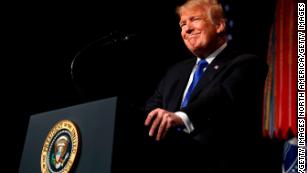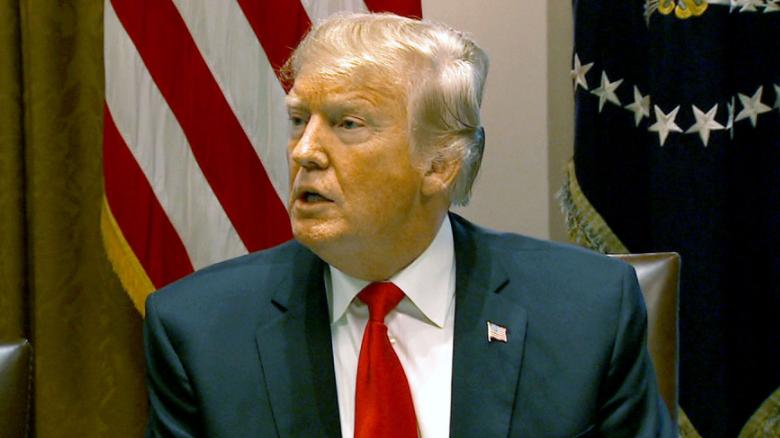The problem with this is the following things: - To the best of my ability I write about my experience of the Universe Past, Present and FutureShowing posts sorted by relevance for query national emergency declaration. Sort by date Show all posts
WEDNESDAY, JANUARY 9, 2019
Republicans Shrug Off Trump Toying With National Emergency For Border Wall?
begin quote from:Republicans Shrug Off Trump Toying With National Emergency For Border WallPOLITICS 01/09/2019 05:48 pm ETRepublicans Shrug Off Trump Toying With National Emergency For Border Wall
Republicans, who used to complain of “executive overreach,” are generally squirming but shrugging over Trump’s threats.By Matt FullerXWASHINGTON ― With President Donald Trump floating the idea of declaring a national emergency to bypass Congress and build his promised border wall, Republican lawmakers are sounding uneasy ― though not necessarily opposed.After spending years decrying “executive overreach” over President Barack Obama’s moves around Congress, Republicans on Capitol Hill are generally squirming but shrugging over Trump’s threats, which he renewed again Wednesday.“I think we might work a deal, and if we don’t, I may go that route,” Trump said of declaring a national emergency and building the wall through a re-designation of funds. “I have the absolute right to do national emergency if I want.”With negotiations over reopening government continuing to fall apart, the national emergency gambit is looking more likely by the day. Trump would declare a crisis on the U.S.-Mexico border, use an obscure authority to take unspent money to start wall construction, and Republicans and Democrats could vote for spending bills without wall funding.The wall construction would likely then be halted by a court, but Trump and Republicans would have their justification for reopening the government. BLOOMBERG VIA GETTY IMAGES
BLOOMBERG VIA GETTY IMAGESThe idea of Trump appropriating money to projects Congress has blocked is fundamentally contrary to the Constitution, but he’d likely find a lot of Republicans who’d reluctantly go along. Trump’s legal authority to disregard Congress and spend money that Congress has very explicitly not appropriated is dubious at best.Republicans point to reprogramming authority the president has in cases of a national emergency, in which Trump could spend money designated for military construction projects on other projects he deems more important. Rep. Mac Thornberry (R-Texas), the ranking Republican on the Armed Services Committee, explained how that would work to the GOP conference on Wednesday morning.The statute aside, the idea of Trump appropriating money to projects Congress has blocked is fundamentally contrary to the Constitution. But if Trump went that route, he’d likely find a lot of Republicans who’d reluctantly go along.And some GOP lawmakers would cheer him on.Sen. John Kennedy (R-La.) said Trump had a “legal basis” for declaring a national emergency. “I have read the law. It would not be frivolous if he does it,” Kennedy said.Texas Rep. Randy Weber said he thought the border was a national emergency and that he “absolutely” supported the president building the wall through that sort of declaration.“Obviously, we don’t want any executive to overreach,” Weber said. “But if this is indeed truly a national emergency, and he has that power, then he’s well within his power to do that.”Weber was also unconcerned that Trump’s remedy for this “national emergency” would be a wall that would take years to build.“Bill Clinton said he wouldn’t drill in ANWR,” Weber said, referring to the Arctic National Wildlife Refuge in Alaska. “He said even if he agreed to it, it would take 10 years for Americans to see any of that oil. When did he get out of office? So you gotta start somewhere.”Obviously, we don’t want any executive to overreach. But if this is indeed truly a national emergency, and he has that power, then he’s well within his power to do that.Rep. Randy Weber (R-Texas)
Rep. Joe Wilson (R-S.C.) also told HuffPost he supported the president using a national emergency declaration to build the wall ― “I remember the argument against a fence in Jerusalem,” he said ― but even the Republicans who expressed some uneasiness with the president going around Congress to build a wall left themselves plenty of room if Trump did declare a national emergency.Subscribe to the Politics email.How will Trump's administration impact you?Freedom Caucus Chairman Mark Meadows (R-N.C.) said he looked at that sort of maneuver as a “very last resort” and had encouraged Republicans and the president to keep negotiating, but he also said it was “a tool in his toolbox.”“I’ve read two different statutes that seem to give him authority in this particular case to do that,” Meadows said. “My concern is, where does it lead from there? I mean, is everything a national emergency? Is climate change a national emergency? My reluctance is more on what the slippery slope might be.”But Meadows again stressed that this was an option for Trump and said he wouldn’t back legislation to restrict the president’s ability to declare a national emergency to bypass Congress.Rep. Scott Perry (R-Pa.) ― another prominent Republican in the Freedom Caucus ― said he wasn’t going to rush to judgment.“I would prefer the legislative option,” Perry said. “But if he keeps on trying and trying and trying, and the other side is so intractable that they refuse to discuss it, what other option do you have?”Senate GOP leaders also had wishy-washy statements about the maneuver.Senate Majority Whip John Thune (R-S.D.) said he thought a national emergency declaration was something Trump and the administration were reviewing. “Can he? Probably,” Thune said.Thune’s predecessor as whip, John Cornyn (R-Texas), said the declaration shouldn’t be necessary “even if it is theoretically available to him.” He added that it would likely cause a lawsuit, “so that means rather than solving the problem in days, you’re looking at months or years until the issue is resolved.”But Republicans aren’t exactly standing in the way of Trump declaring a national emergency to subvert Congress, even after Republicans were livid that Obama said he had a “pen and a phone” to ram through his legislative agenda.Rep. Barry Loudermilk (R-Ga.) said he’d prefer Trump build the wall through a congressional appropriation so that he didn’t have to pull money from other military construction projects, “but it is a crisis that we do need to address.”Mark Walker (R-N.C.) said he thought a national emergency declaration would get into “some gray area,” and said he would be “uneasy” with Trump building a wall that way, but he said he couldn’t “go out affirmatively and say he can’t do that.”And even libertarian-minded Thomas Massie (R-Ky.) wouldn’t speak against Trump using a national emergency declaration to get around Congress.“I haven’t considered the proposal seriously,” Massie said.If it’s an emergency, everyone will know it, and everyone doesn’t know it, so it’s not an emergency.Rep. Justin Amash (R-Mich.)
Some Republicans entirely dodged the question. Rep. Sean Duffy (R-Wis.) said pieces about him in HuffPost “have not been the best, so I’m gonna give you no comment.” Rep. Kevin Brady (R-Texas) referred us to a statement about Trump’s address Tuesday night that did not answer questions about a national emergency declaration. And Rob Bishop (R-Utah) said he wasn’t “ready for hypotheticals.”“When he does it, ask me,” Bishop said.Of the lonely GOP voices opposing such a move, there weren’t many real repercussions offered if Trump went ahead with an emergency declaration. Sen. Lindsey Graham (R-S.C.) said that was not his preferred route, and he questioned whether Trump could legally do that, but he didn’t offer any recourse if he did.Surprisingly, Rep. Roger Williams (R-Texas) said he didn’t support the president using a declaration to build the wall. “I think we need to go through Congress,” Williams said, agreeing that doing otherwise would amount to executive overreach.And unsurprisingly, Rep. Justin Amash (R-Mich.) was the most vocal. “I’m totally against that,” Amash said.Amash said he would even support legislation restricting the president’s ability to declare an emergency for purposes of building a wall, and suggested the situation at the border was not as dire as Trump or other Republicans made it out to be.“If it’s an emergency, everyone will know it, and everyone doesn’t know it, so it’s not an emergency,” he said.Asked what he thought about Republicans criticizing Obama for executive overreach and now standing by Trump as he toys with this idea, Amash was plain-spoken. “I think it’s embarrassing,” he said.Exclusive: White House preparing draft national emergency order, has identified $7 billion for wall
By Priscilla Alvarez and Tammy Kupperman, CNNUpdated 5:57 PM ET, Thu January 24, 2019Washington (CNN)The White House is preparing a draft proclamation for President Donald Trump to declare a national emergency along the southern border and has identified more than $7 billion in potential funds for his signature border wall should he go that route, according to internal documents reviewed by CNN.Trump has not ruled out using his authority to declare a national emergency and direct the Defense Department to construct a border wall as Congress and the White House fight over a deal to end the government shutdown. But while Trump's advisers remain divided on the issue, the White House has been moving forward with alternative plans that would bypass Congress."The massive amount of aliens who unlawfully enter the United States each day is a direct threat to the safety and security of our nation and constitutes a national emergency," a draft of a presidential proclamation reads."Now, therefore, I, Donald J. Trump, by the authority vested in me by the Constitution and the laws of the United States of America, including the National Emergencies Act (50 U.S.C 1601, et seq.), hereby declare that a national emergency exists at the southern border of the United States," the draft adds.The draft was updated as recently as last week, a US government official told CNN.According to options being considered, the administration could pull: $681 million from Treasury forfeiture funds, $3.6 billion in military construction, $3 billion in Pentagon civil works funds, and $200 million in Department of Homeland Security funds, the official said.As lawmakers discussed a short-term measure to fund the government Thursday, Trump again raised the prospect of other ways to fund a border wall without congressional approval."I have other alternatives if I have to and I'll use those alternatives if I have to," he told reporters."A lot of people who wants this to happen. The military wants this to happen. This is a virtual invasion of our country," Trump said.The Defense Department referred a request for comment from CNN to the White House.If the declaration is made, the US Army Corps of Engineers would be deployed to construct the wall, some of which could be built on private property and would therefore require the administration to seize the land, which is permitted if it's for public use.The administration's plans acknowledge the possibility for lawsuits if they move forward with acquiring private property. The documents also reflect a sense of urgency with administration plans, noting that environmental reviews can be skipped and DHS can use waivers to bypass contracting laws.If the President proceeds with the declaration, it'll likely be challenged in court and by Democrats in Congress, as critics have argued that Trump cannot use the national emergency authority to free up taxpayer funds and build the border wall he has long promised his political supporters.The question of legality and court challenges is still one of the main hang-ups in using executive action to secure the wall funding. Trump's advisers have cautioned that taking that route would lead to certain legal challenge, meaning the wall construction would still be delayed.The draft document cites Title 10 of the US Code, which allows Trump to unlock a stash of Pentagon funds that are earmarked but have no signed contracts for spending that money. That would give the President authority to pull from military construction funds and civil works projects, like infrastructure repair projects.Rep. Dan Crenshaw, R-Texas, tweeted earlier this month that acting White House Chief of Staff Mick Mulvaney, "assured Texans that he understood the deep concerns about using Harvey relief funds for the border." CNN previously reported that the Pentagon was asked to provide a list of those projects in anticipation of a national emergency.The Pentagon has assisted the Department of Homeland Security in the past. For example, the Army Corps of Engineers, a federal agency within DOD that provides public engineering services, has helped evaluate prototypes of the border wall.Options under consideration conceded that acquiring private property would take time. Even if voluntary, the land could take up to a year to be acquired. Land condemnation cases are known to take time because property owners have the right to sue. A national emergency declaration would not speed that process up, a government official says.Customs and Border Protection has said that it would consider eminent domain in the future."It is always CBP's preference to acquire property through a voluntary, negotiated sale. The Government will attempt to negotiate an offer to sell using survey data and value estimates gleaned from the surveying process," reads an excerpt in a border wall Q&A on their site. "The Government will attempt to negotiate an offer to sell before moving forward with exercising eminent domain. However, if the Government and landowner are unable to reach a negotiated sale or if the Government is unable to obtain clean title, the Government will need to file an eminent domain action."CNN's Kevin Liptak contributed to this report. begin quote from:White House preparing national emergency proclamation
To the best of my ability I write about my experience of the Universe Past, Present and Future
Top 10 Posts This Month
- Here Are the New Members of Donald Trump’s Administration So Far
- Crowdsourcing - Wikipedia
- The AI Translated this about Drone Sightings in Europe from German to English for me
- Trump and Musk unleash a new kind of chaos on Washington
- reprint of: Friday, March 18, 2016 More regarding "As Drones Evolve"
- The state of the Arctic: High temperatures, melting ice, fires and unprecedented emissions
- "There is nothing so good that no bad may come of it and nothing so bad that no good may come of it": Descartes
- The Future of Climate Action Is Trade Policy
- I tried to get a copy from France from French Wikipedia but it just took me back to English Wikipedia:
- More regarding "As Drones Evolve"
Thursday, January 24, 2019
Trump is hitting the red button?
The problem with this is the following things: begin quote from:White House preparing national emergency proclamation
Subscribe to:
Post Comments (Atom)





















No comments:
Post a Comment